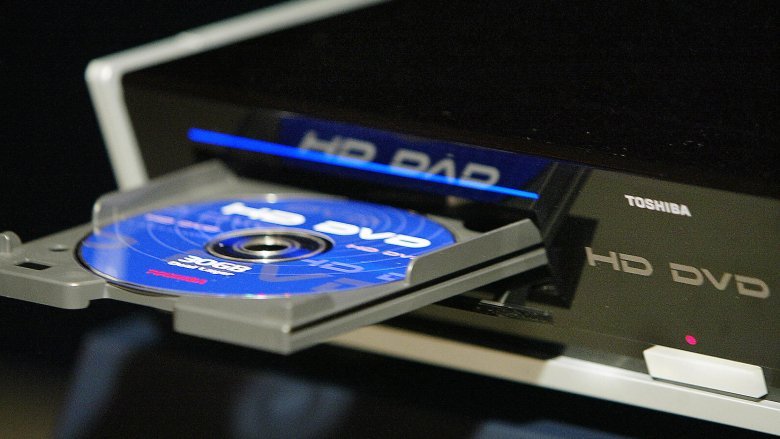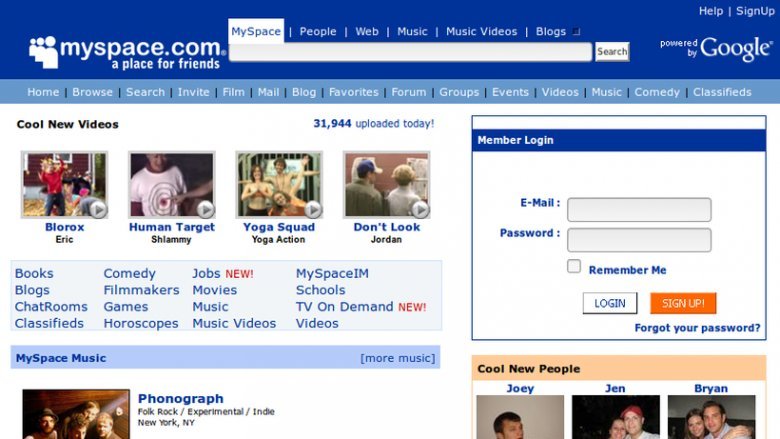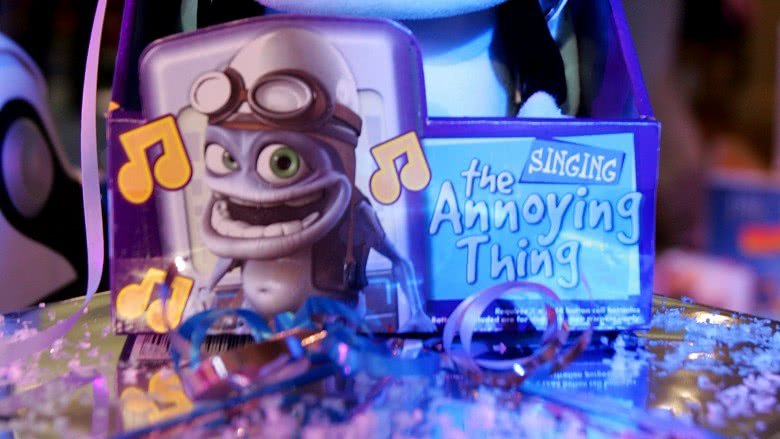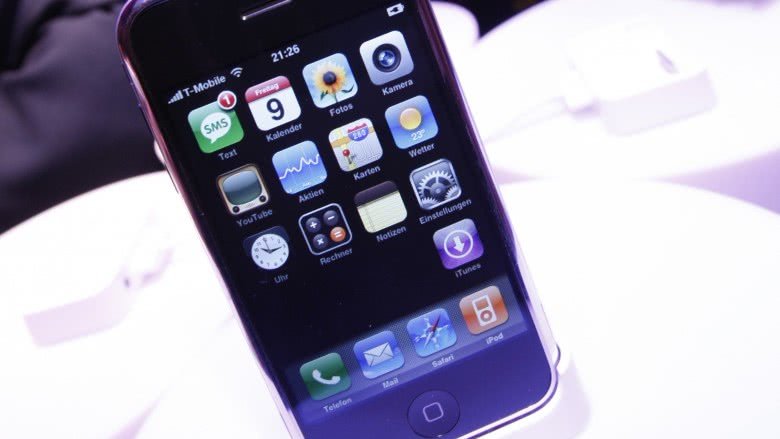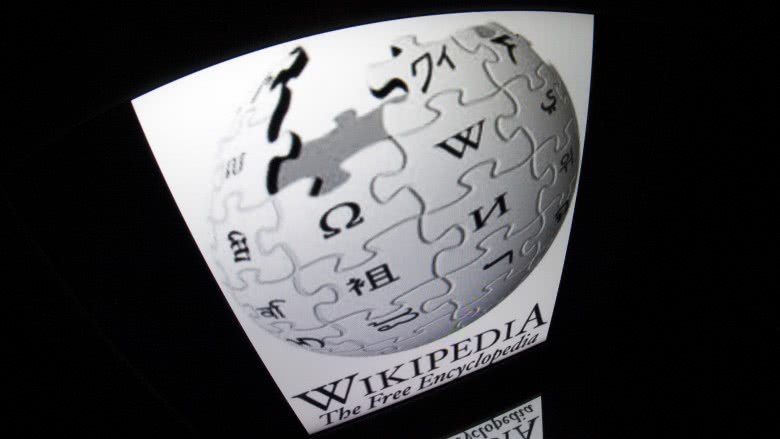Things People Believed 10 Years Ago That Ended Up Being Wrong
We may receive a commission on purchases made from links.
The "format wars" of the late 2000s ended so definitively hardly anyone even remembers there was a progression hiccup between DVD and Blu-ray. High-definition DVDs became the current generation's Betamax despite having a significantly lower price point and some early studio support. Blu-ray always had the distinct advantage of being built into PlayStation and other video game consoles. However, some people thought that because many porn studios became early adopters of the HD-DVD format, it could be a turning point. And not just the kind where you try to get a better angle.
Legend goes that porn studios picking VHS rather than Betamax killed the latter faster than ice water down the pants would kill a ... you know. However, that love affair didn't last. Blu-ray porn releases sold much faster than HD-DVD. Perhaps the market demand for a device that could play both video games and porn was too powerful to defy.
Housing bubble? What housing bubble?
As the opening teaser to what became a massive financial crisis, the collapsing of the mortgage bubble in the U.S. was a pretty big deal. This is the kind of thing that ridiculously rich financial experts supposedly help us avoid. Yet many of those experts claimed they never saw it coming.
Of course, financier and stock broker Bernie Madoff (who was not yet disgraced at this point) was pretty optimistic about the whole thing because he was basically the fox selling life insurance policies throughout the henhouse with himself as the beneficiary. But plenty of other people chimed in who should have known better. Like the financial products head of AIG, Joseph Cassano, who was basically the insurance company in this metaphor. Or someone like former Treasury Secretary Hank Paulson, who doesn't fit into this metaphor at all. (Metaphors are messy, OK?)
Even Ben Stein, who you might not know as a conservative economics commentator but definitely know as the man that said "Bueller, Bueller, Bueller ...," described the bubble as just a bunch of lucky "super-bargains" with no consequences to be concerned about. If you can't trust the economic opinions of the host of Win Ben Stein's Money, who can you trust?
Everyone thought Hillary Clinton would be president ... in 2008
We had a pretty tense election not too long ago. We had Hillary Clinton, with an established political career, against a relative newcomer. Polls and predictions were all in her favor; she seemed to be the winning ticket. Then, all of a sudden ... she didn't even win the primary. Wait, what year did you think we were talking about?
To be fair, a decade ago, she definitely seemed a shoo-in. She was leading the polls, and Al Gore's insistence on not running seemed to promise an even greater lead as she was expected to get the majority of the votes that would have gone to him. People were so sure she'd beat Barack Obama that there are hubris-drenched actual written and published hardcover book titles declaring it, which aged about as well as 2004 Bill Gates claiming spam email would be over by 2006.
A lot of folks chimed in on Hillary's win ability, or Obama's lack of it, a decade ago. We're counting both because they're both just as wrong. On the conservative side were Joe Scarborough, Charles Krauthammer, and Bill Kristol; the liberal side had Mark Penn and the late Christopher Hitchens. It's kind of a shame that one of the few things you could get true bipartisan agreement on had to be a faulty prediction.
Arctic summers would be ice-free by now
Based on modeling studies in 2007, which was a really bad year for arctic ice, scientists predicted that within less than a decade arctic penguins and polar bears might have to browse some beach wear. Remarkably, the modelling hadn't even incorporated the drastically low 2007 arctic ice coverage into their modelling, only using data up to 2004. Things looked pretty bleak, but thankfully that prediction was wrong.
Don't take this as an excuse to suddenly ride through town on a centaur with "CLIMATE CHANGE IS NOT REAL" tattooed on his glistening abs, but this particular prediction doesn't prove anything one way or the other except for an assessment of possible damage. It's also worth noting that after a few good years there was a dip in arctic ice coverage in 2016 comparable to 2007, which is now the second lowest recorded coverage in modern history.
We could still see penguin bikinis in our lifetime if we aren't careful. Despite how cute that sounds, it's probably not a good thing.
Virtual worlds were going to take over everything
By 2007, Second Life was already around for a few years. People still weren't sure what to make of it, but they also thought it would take over everything. Social media was becoming a pretty big thing (but nobody knew quite how big yet) and theorists like Digital Media Wire's Ned Sherman predicted that such virtual worlds could be the next big step. He noted that Second Life was developing its own in-game economy with a nearly standardized exchange rate between real-world and virtual currency. Remember, this was still quite a few years before "microtransactions" were regularly groaned about.
He claims, "Second Life may not grow to the scale of a MySpace or a YouTube, but it may be laying the groundwork for something that will," implying a potential merge between social media, content-creation, and peer-to-peer all virtualized. Which actually sounds amazing, even if it is the plot of dozens of sci-fi dystopias. Meanwhile, investors of the time wondered if such an environment, part MySpace and part World Of Warcraft, could also be part of the future of the gaming market.
Unfortunately (?), such an environment is still more the realm of gritty '90s cyberpunk stories than real life. Virtual reality still gives a lot of people nausea and headaches, and parents use social media now, so it's become more user-friendly and less technologically flashy. All we have left of this dream is the opportunity to spend real money on virtual game pieces in the Pokemon and Angry Birds games we play on our phones. Kinda sad actually.
Myspace could stay easily stay ahead
"Will Myspace ever lose its monopoly?" asked The Guardian's Victor Keegan in February 2007. Now it's hard to believe it ever had one. Wedged firmly into history among other late aughts embarrassments like emo bangs and Four Loko, it's hard to picture Myspace as having the cultural or financial footprint it had back then. At the time, however, it had a definite lead over both Facebook and YouTube until it decided to compete with both simultaneously by becoming a Frankenstein amalgamation of the two.
It rebranded itself as a "social portal" as response to competition in the social media field, deciding to more on focus on video and music sharing. That was cool, but then Twitter happened, and Facebook was better prepared to compete because Facebook wasn't distracted trying to be YouTube. As Facebook constantly evolved in the social media game, it eventually became the face of it, leaving MySpace's layout looking bland by comparison.
Before you could even belt out a soulful rendition of "How Could This Happen To Me?" to your Jeffree Star poster, MySpace was done.
The Aughts aren't exactly an ancient, prehistoric era — in fact, a good chunk of it is strikingly similar to today's world. In 2007, for example, we were eagerly awaiting another Pirates of the Caribbean film and a Spider-Man movie. Beyoncé and Rihanna topped the charts, and everyone was wrapped up in the drama of the sexy doctors on Grey's Anatomy. So, life might not seem that different from then. The world certainly hasn't changed that much in the past ten years, especially when compared to how much its changed in the past 25, 50, or 100 years.
That said, 2007 wasn't exactly the same as today. In fact, a lot of predictions and beliefs from just a decade past ended up being completely incorrect.
Ringtones could save the music industry
Oh man, remember when the latest Evanescence track would come out and you'd run to iTunes to download it as a ringtone? It was so cool, making everyone hear little snippets of songs every time you got a phone call or text. And we can all agree, if you want prime sound quality, you've got to hear the song playing from Motorola Razr.
Ringtones were huge business ten years ago, an embarrassing fact for all of us who bought "Clocks" by Coldplay to announce our phone calls. Since the music industry was starting to falter from piracy and a move toward digital single sales, the great ringtone sales gave industry insiders hope. CNN Money reported that experts weren't sure if ringtone sales would continue to rise, but they'd certainly be used to promote artists. At the time, Madonna's single Hung Up was introduced as a ringtone before it came out as a single, and experts figured that trend would stick around for a very long time.
Unfortunately, iPhones came out, your phone became your MP3 player, and somehow as a nation we all realized how stupid it was to play a 30-second clip of a song every time we got a damn call. There's no better way to never want to hear a song again than by having it play every time Sallie Mae phones to hassle you about student loans, so ringtones' effectiveness as a promotional tool slowly faded away.
The iPhone would fail
With a headline that it'll probably regret for the rest of its days, Tech Crunch confidently announced in 2006: "We Predict the iPhone Will Bomb." It's a classic "Dewey Defeats Truman" type of headline that will go down as one of the most wrong things ever said. Now, Tech Crunch wasn't insane. When the iPhone first came out, it seemed ridiculous that a phone would have so many extraneous uses. Sure, checking your email on your phone is great, but what else would anyone want to do on their phone? Conan O'Brien even ran a sketch making fun of the phone's many uses.
But why was Tech Crunch so sure the iPhone would be a disaster? First, they thought the glass would result in lots of cracked screens. This is true, but everyone just buys a new phone or pushes through the finger cuts when playing Farmville. They also believed the iPhone's keyboard was laughable, comparing it to a rotary phone.
They also figured people would flock to iPods. "Since AT&T is REQUIRING iPhone purchasers to sign up for two-year contracts (any lawyers out there know if this is legal?), it isn't difficult to imagine folks who have no real need for the phone aspect looking for a nice web-browsing widescreen iPod. But boy will they be expensive (probably about $750 new)." The iPod Touch stuck around for a while, but they were never as pricey as iPhones or got anywhere near a $750 price tag.
Radiohead's In Rainbows online release would destroy the music industry
Radiohead made a bold move with the release of its album In Rainbows. Before selling physical CDs, it sold digital downloads, and customers could pay whatever they wanted for the album. Whether they chose to pay nothing or $50, they'd get the same songs. Some people praised Radiohead for breaking away from major labels, but a lot of people were very worried about the moody band's new record-selling technique.
The Sunday Times called it "the day the music industry died." The headline was a bit melodramatic and a horrible sequel to the song "American Pie," but The Guardian went even further. It said that though the pay-what-you-want ploy worked for the popular band, it was a death blow to up-and-coming musicians. Sure, Radiohead could afford to give its stuff away, but new bands don't have the luxury of big money-making tours.
The idea that the record industry was changing and physical sales would never be what they were was spot on. But In Rainbows had little to do with it. The arrival of Spotify and streaming services has upset sales a lot more than bands doing a pay-what-you-can system. Oddly enough, Radiohead refuses to put its music on the streaming platform, claiming it's a bad deal for the artists. Classic.
The Wii was the future of gaming
Nintendo has had high highs and low lows for many years, but the company thought their troubles were over when the Wii hit the shelves. When the active video game console was released, it was an immediate hit. While PlayStation and Xbox were reducing their console prices, Wii's were flying out of stores at full price. It looked like Nintendo was on top again and might even take out its competitors once and for all.
People loved that the Wii required physical movement, and Wii Fit was a growing fitness craze. Gamers were coming together to form Wii bowling leagues, and even senior centers were getting on the Nintendo bandwagon. Wii was the future, all hail Wii! The Wii-volution didn't last, as sales peaked in 2008. PlayStation and Xbox upped their game, and their games steadily upped Wii's sales.
Nintendo still wasn't worried about the competition. They thought having an affordable console with average graphics and a limited variety of games would be just fine. But it wasn't. As their competitors' games grew more and more graphically impressive, Wii stayed the same, and people realized there's only so many times you can pretend to play tennis in your basement before getting bored. By 2013, Nintendo stopped production on the original Wii, and the days of Wii bowling leagues are long in the past.
People would be too lazy to keep making internet content
Tech Crunch had a bit of a hard time ten years ago. After its announcement that the iPhone would be a big pile of garbage, it went on to say that laziness would lead to the end of user-created content. Again, this isn't crazy logic. People are lazy, and they tend to get bored of any major fad (such as the Wii), so it makes sense that sites dependent on user-generated content would run out of steam and become Friendster-like fads.
What Tech Crunch didn't predict was how much people love seeing themselves and expressing their myriad opinions to the world. The article stated that when Facebook went the way of Myspace, "it might be time to grow up and invest your time in LinkedIn." Really, the idea that LinkedIn could ever compete as a social media site is the real crime here.
TC also predicted Wikipedia's days were numbered. "And Wikipedia—perhaps the Web's greatest gift to humanity—is based on the idea that people will be generous with their time and editing skills." Again, this prediction was incredibly wrong. Sure, there are plenty of trolls online, but lots of smart people still love putting out content. Giving people a way to anonymously post their thoughts, opinions, and sometimes very dated points of view has proven to be exceedingly popular. Sure, Facebook might give way to another future social media site, but unless there's some kind of electrical apocalypse, it's hard to imagine a world where people get tired of posting pictures of their own face and their hot takes about the Marvel Universe.
Voice recognition technology in cars would actually work
Ten years ago, Ford and Microsoft debuted Sync, an entertainment system in cars that would let you connect your phone to the system via Bluetooth and have a readable electronic display. You're probably pretty familiar with this, since pretty much all new cars have a similar system, and it works well. But one of the biggest things Ford was excited to announce was their advancement in voice recognition technology.
They bragged that you could play songs entirely via voice control. After your MP3 player was indexed, you could say "Play Avril Lavigne" or request a specific song by saying "Play track 'My Humps.'" As you may have guessed, this didn't quite work out.
Voice recognition is still a part of many cars, but it's far from the revolutionary device they made it out to be. Really, try to play a specific song in your car. You'll end up crashing into a tree with rage before you ever get your Rage Against the Machine song to play. Even today, we can hardly get Siri or Alexa to play an artist without repeating it ten times and holding back your anger toward the faceless robot. Voice recognition technology is getting better, but just barely and just in the last few years. In 2007, nobody was having a good time talking to their car, and now, the voice prompts in cars are seldom used.
The Flip camera would be around forever
Camera technology has rapidly changed over the last 30 years. Going from something you could only have access to in a fancy studio, to a bulky over-the-shoulder model where half your videos would come out as straight darkness because you forgot to take the lens cap off, to digital cameras, it kept getting easier to make videos. When the Flip cam came around, it seemed like we'd reached the pinnacle of affordable filmmaking.
The Flip Video Ultra was super small, inexpensive, and captured pretty good-quality video. It was easy enough to carry around, unlike many home video cameras of the past. Other manufacturers were copying their design and putting out light cameras of their own. With its winning combo of good price, size, and quality, people couldn't imagine this camera going out of style any time soon. But then came the iPhone.
Before iPhones, there were cameras on cell phones, but those cameras sucked, and they sucked hard. The idea that phone cameras would ever be popular seemed ridiculous. Where would you ever get enough memory? But then old iPhone came along with their good camera and decent storage, and people realized they didn't really need to carry a bothersome Flip cam when they had everything they needed in the palm of their hand already. By 2011, the promising Flip was obsolete, rendered useless by that "bomb" of an iPhone.
Brian Williams thought we'd all have chips under our skin
In 2007, Brian Williams ran a story about predictions for America's future ten years down the line. Since it was coming from Brian Williams, you knew it had to be true and very trustworthy. B-Dog would never exaggerate a story for dramatic effect.
The segment focused mainly on how technology would change in a decade's time. Of course, it starts out insanely wrong. "The year is 2017. You're rushed to a hospital unconscious with no ID or medical history," said reporter Tom Costello. "But thanks to a microchip under your skin, it's all there." Reality check: Just like in 2007, if you're rushed to the hospital with no ID in 2017, you still get a crappy chair until someone proves you've got money. And although you can get chips implanted under our skin, we as a nation have overall chosen not to put computers in our arms and treat ourselves like stray dogs.
The story goes on to talk about facial recognition technology and how it will be able to pick a single face out of a crowd with ease. Since half the time Facebook and iPhoto facial recognition think boobs are faces, we probably don't need to worry about getting singled out in a hoard any time soon. The segment ends by comparing 2017 to the world of Minority Report. Sure, even today, Google can stalk your every move and major companies can buy your most personal info, but if you think a Macy's is going to recognize you from an iris scan and try to sell you custom perfumes in the near future, no way.
